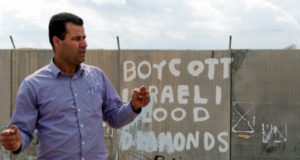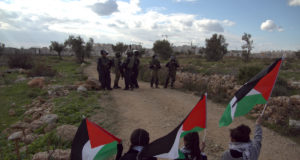The judges, Barak, Prokachia, and Rivlin, presiding over the court case protesting the route of the wall in Bil’in village have not yet reached a decision.
In the last hearing, which took place May 14, 2006, the applicant, Bil’in village council, was represented by Michael Sfard, who argued that the wall is not designed to protect people, but rather to protect the investment of real estate sharks and to accommodate the expansion of settlements.
The eight lawyers representing the respondents- the state, Modi’in Illit council, and the real estate companies involved in the Matityahu Mizrakh Project- tried to convince the court that the route should remain as it is. Their main argument was that there is a government approved plan from 1999 for 1,500 housing units that occupies the same area that the current unapproved, illegal plan of 3,000 housing units of Matityahu Mizrakh East occupies.
Attorney Michael Sfard, representing the Bil’in village council, mentioned prior decisions from other cases as examples that the route of the wall should not be designed to include unapproved plans for settlements or illegal outposts. Nevertheless, the court seems very concerned with the fact that, illegal or not, Matityahu Mizrakh has already been built and 80 families have already moved in.
Bil’in village council has also filed another petition to the court, case 143/06, challenging the legality of the existence of the settlement because of a suspicious transfer of ownership of the land from the village to the realtors, by the state declaring the land state land only to later transfer it to the developers. A criminal investigation into the illegal building in Matityahu Mizrakh was instigated after the scope of the illegalities was exposed in court. Recently the villagers filed a third petition, number 3998/06, asking to cancel the designation of their lands as state property.
At some point during the latest hearing, Judge Prokachia, seemed to be convinced by the defendant arguments and asked Attorney Sfard to consider withdrawing the petition because she said it is without sufficient grounding in facts. Sfard refused. After continuous discussion, Sfard proposed to the court not to make a decision on this petition until a verdict is reached on the cases involving the legality of the settlement, case 143/06. The judge, Barak, seemed like he was accepting of this option, but did not make a decision immediately.
The state expressed dissatisfaction with the fact that currently, according to the courts request, there is an open gate in the fence that the villagers use to access their land. The state asked the court to allow them to set up an agricultural gate, which only farmers with individual permits will be allowed to cross. Sfard asked that the court to uphold the court injunction that was originally given when the court refused to freeze the construction of the wall in it’s current route, saying that all the villagers can have access to their agricultural land.
The State’s lawyers said that Palestinians who enter the gate then have access to the settlement and Israel. One of the solutions that Sfard brought up is to close the gate on the settlement instead of closing the gate on Bil’in.
The judge, Barak, proposed that the two sides agree on further limitations to be imposed without preventing completely the movement of Palestinians over this land. No decision was reached about this either at this point in time and the issue has been left open.
For more information:
Muhammad Khatib 0545-573-285
 International Solidarity Movement Nonviolence. Justice. Freedom.
International Solidarity Movement Nonviolence. Justice. Freedom.


